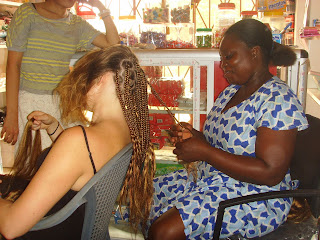When I arrived in Ghana in September, it was the end of the rainy season. This meant that it rained occasionally, but there were plenty of hot, sunny days in between. What we would call winter is undeniably Ghana’s dry season. Between Christmas and the middle of March when the volunteers left, it didn’t rain at all. Not even once. After that, it started to rain, every once in a while.
Since I returned from my week-long visit with my parents, the rainy season has hit with full force. What does this mean? Well, it means that it rains a lot (duh). I would say that for day of sun, there is one day of overcastness and one day of rain. Because of this, it’s also a lot cooler. The past couple nights, I’ve even had to sleep in socks to keep my feet warm! Granted, I don’t think it ever dropped below 70 degrees or so… but compared to the peak of the dry season, IT’S FREEZING!
Aside from the actual weather patterns, the rainy season has had a pretty significant impact on my day-to-day life here in Tema. The following results range from trivial to potentially serious, but they’re all differences that I’ve noticed in the past several weeks.
- My tan is gone! It’s kind of embarrassing to admit, but I think that after spending a year in Ghana, I might come home a few shades paler than when I left the States. That’s not exactly what you expect from a year in Africa. But with so much rain, and so little sun, excursions and adventures outside just don’t really happen!
- Doing wash can’t be taken for granted. Here everyone handwashes their clothes and hangs them to dry on lines outside. In the dry season, or even at the end of the year… there are plenty of dry, sunny days to for this method to work. But now, in the rainy season, often times a sunny morning will lead to a rainy afternoon. Or it will randomly start pouring in the middle of the night. Meaning that any clothes drying outside will get wet. It means that if I need to do laundry, I have to take advantage of every sunny day possible!
- Getting around is more difficult. Where we stay is peri-urban. There are some gravel roads in the newer parts, but most of the roads and surrounding land is dirt. It is unpleasant to walk in the rain, yes. And because most people around here walk (it takes about 15 minutes to walk to catch a bus), when it rains, people just stay at home. But it’s also difficult to walk through mud. It becomes a game of finding what I call the path of most resistance, or where the ground has remained the sturdiest and is the least saturated with water.
- It is much harder to hold regular meetings. This is a corollary of the first point. Since I returned from my trip, Jamie and I have tried to hold a MAC meeting every single Sunday. I think we succeeded once (at the very beginning). Every other time, it has rained. A couple of times it will be clear in the morning, allowing us to get our hopes up, only to begin pouring an hour or two before the meeting is supposed to start. Because of this, our progress has been slower than we would have liked.
- School attendance is less regular. This is another corollary. Rainy mornings mean a couple things. 1) Students and teachers often oversleep. Because most people don’t use alarm clocks, they have just trained their bodies to wake up on time. Cooler, rainy mornings, often trick people into sleeping later, making them late for school. 2) If it’s raining, it’s difficult for teachers and students to get to school. While there are sometimes snow delays in the US, almost every time it storms, Manye essentially has an unofficial rain delay.
So while the changing of the seasons in Atlanta is little more than bringing out appropriate clothing or outerwear (or maybe bringing out the snow shovels in Hanover), in Ghana I’ve found that the changes actually affect the lives of me and the people around me. But hey, it’s all part of the adventure!
















